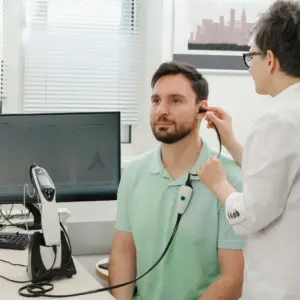Sound Advice: What Is Hearing Health?
Hearing health is more than just the ability to hear loud and soft sounds; it’s a complex system that enables us to engage with the world in meaningful ways. This article delves into hearing health’s essence, significance, and how we can nurture it.
Understanding Hearing Health
Hearing health is not merely about detecting noise; it involves making sense of sounds. This includes clarity of speech, the ability to locate where sounds are coming from, and distinguishing between different sounds in a noisy environment. The inner ear’s role extends to aiding balance, illustrating the multifaceted nature of hearing health.
The Importance of Hearing Health
Hearing health is foundational to our interaction with the world. It transcends the basic function of sound detection to encompass a wide range of vital activities and experiences in our daily lives.
Facilitating Communication and Connection
Central to human experience, hearing enables us to communicate effectively. From the soothing sound of a loved one’s voice to the critical nuances in a business meeting, hearing shapes our ability to connect. It supports language development in children and plays a crucial role in social interaction throughout life. Misunderstandings and frustrations often arise when hearing is impaired, highlighting the importance of clear hearing in maintaining strong relationships.
Enriching Life’s Experiences
Life’s moments include sounds: music that stirs the soul, the calming rhythm of waves crashing on the shore, or the laughter of friends. These sounds enrich our lives, adding depth and emotion to our experiences. Good hearing health allows us to fully appreciate these moments, enhancing our quality of life and emotional well-being.
Ensuring Safety and Awareness
Hearing is a key sensory mechanism for detecting danger. It helps us recognize approaching vehicles, alarms, and emergency signals. At home, it alerts us to hazards such as a boiling kettle or a crying child. On a broader scale, hearing is crucial in environmental awareness, enabling us to navigate our surroundings safely and efficiently.
Supporting Cognitive Functions
Emerging research underscores a significant link between hearing health and cognitive function. Hearing loss has an increased risk of cognitive decline, including conditions like dementia and Alzheimer’s disease. This connection stems from the increased cognitive load required to decode sounds, which can detract from other mental processes. Maintaining good hearing health may help preserve cognitive abilities by reducing this load, allowing the brain to allocate resources more effectively.
Contributing to Emotional Well-Being and Mental Health
The impact of hearing health on emotional and mental well-being is profound. Hearing loss can lead to feelings of isolation, frustration, and depression due to difficulties in communication and decreased social interaction. By contrast, good hearing health fosters social engagement, improved mood, and reduced risk of depression and anxiety.
Enhancing Educational and Professional Opportunities
In educational settings, good hearing is crucial for learning and academic success. Students with optimal hearing can better follow lectures, participate in discussions, and engage with their peers. Professionally, hearing health impacts job performance and opportunities. It enables clear communication, enhances teamwork, and contributes to a more productive work environment.
Promoting Independence and Confidence
Good hearing health supports independence and self-reliance. It allows individuals to navigate public spaces, engage in transactions, and respond to others without assistance. This independence fosters confidence, empowering people to participate fully in their communities and pursue a wide range of activities.
Hearing health is a cornerstone of well-being, affecting nearly every aspect of our lives.
Facing Hearing Challenges
Hearing loss manifests in various forms, impacting individuals across different stages of life. It might come gradually, as with age-related hearing loss, or abruptly due to exposure to loud noises or health conditions. Recognizing the early signs of hearing loss, such as trouble following conversations in noisy settings or the need to increase the volume on electronic devices, is critical to seeking timely help.
Find out more about presbycusis or age-related hearing loss.
Pillars of Hearing Health Care
Hearing health care is built on three essential pillars: prevention, diagnosis, and management. Each plays a critical role in maintaining optimal hearing health, contributing to overall well-being and quality of life. Let’s explore these pillars in greater detail to understand their importance and how they interconnect.

Prevention: The First Line of Defense
- Preventing hearing loss is foundational in hearing health care. This involves minimizing risks associated with hearing damage and promoting practices supporting hearing health.
- Protecting Against Noise Exposure: Noise-induced hearing loss is one of the most common preventable hearing loss. Using protective ear equipment in noisy environments, such as concerts, factories, or when using loud machinery, is crucial. Educating the public about safe listening levels, especially when using headphones or earbuds, is vital to preventing hearing damage.
- Healthy Lifestyle Choices: There’s a strong connection between overall health and hearing health. Conditions like hypertension and diabetes can affect hearing, so maintaining a balanced diet, regular exercise, and controlling chronic diseases are part of preventive hearing health care.
- Regular Hearing Screenings: Early detection of hearing loss can significantly impact one’s ability to manage it effectively. Regular screenings for all ages, especially those at higher risk (including older people and workers in noisy environments), are vital. These screenings can catch hearing loss early, often before individuals even notice it.
Diagnosis: Understanding Hearing Loss
An accurate diagnosis is essential once a hearing provider identifies a potential hearing issue. This stage involves a series of evaluations to determine the nature and extent of hearing loss.
Audiological Evaluations: Comprehensive hearing tests conducted by audiologists assess the type and degree of hearing loss. These evaluations include pure tone audiometry, speech recognition, and tympanometry, among others, providing a detailed picture of an individual’s hearing capabilities.
Identifying the Underlying Causes: In addition to determining the extent of hearing loss, diagnosing also involves understanding its causes. This could include age-related changes, noise exposure, genetic factors, or medical conditions affecting the ear. Identifying the cause is crucial for effective management.
Personalized Diagnosis: Every individual’s hearing loss is unique. Therefore, diagnosis is not just about identifying the presence of hearing loss but understanding its impact on the person’s daily life, specific challenges, and personal needs and preferences.
Management: Hearing Health Solutions
Innovations in hearing aids have revolutionized how we address hearing loss. They have so many benefits. These devices compensate for hearing impairments by amplifying sounds, improving speech clarity, and facilitating better engagement in everyday activities. They come equipped with advanced features such as directional microphones, which enhance the ability to focus on conversations in noisy environments and connectivity options for phones and TVs, making them more versatile than ever.
The pillars of hearing health care—prevention, diagnosis, and management—form a comprehensive approach to maintaining and improving hearing health. Through proactive measures, accurate diagnosis, and personalized management strategies, individuals can navigate the challenges of hearing loss and enjoy a high quality of life.

Taking Action
Acknowledging hearing difficulties is the first step toward improving your hearing health. With a range of hearing health solutions available, from sophisticated hearing aids to customized assistive devices, there’s no reason to miss out on the sounds of life. Early intervention and proactive management can transform your hearing experience, boosting your confidence and ability to interact with the world around you.
In summary, understanding, protecting, and enhancing our hearing health are essential steps toward a fulfilling life. If you suspect a hearing issue or just want to stay ahead in your hearing health, reaching out to professionals like those at Stanford Hearing can make all the difference. Contact Stanford Hearing today to protect your hearing health.
